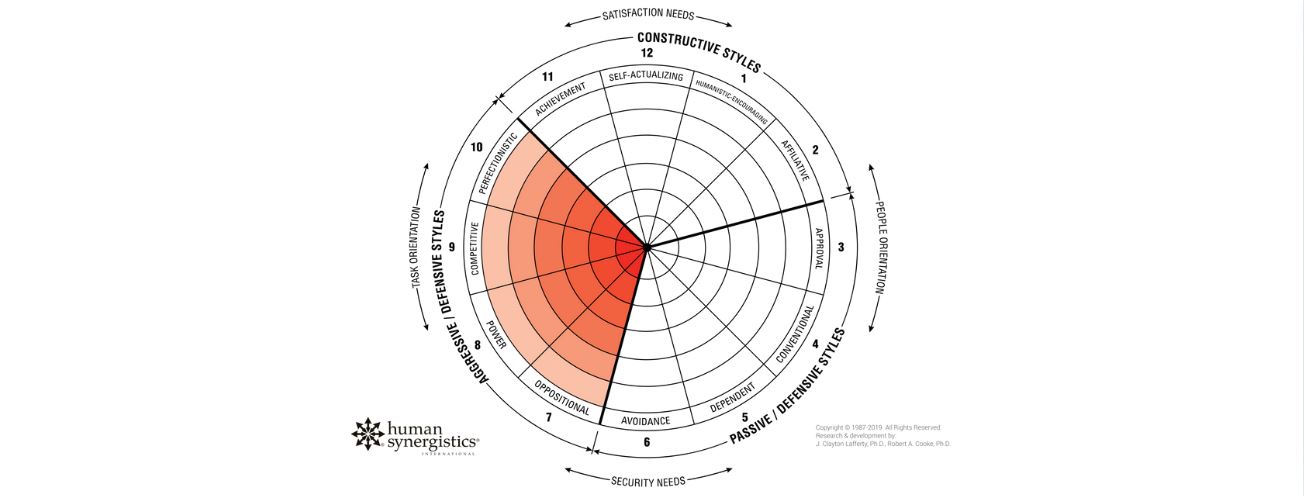Lorraine McCarthy, Counsellor/Coach, Human Synergistics Australia
In my experience Perfectionistic Style is one of the most commonly occurring styles in LSI.
When I see it at moderate levels, I visualise someone who is conscientious. Most of us when describing ourselves, readily give a 2 to items such as ‘competent’ and ‘practical’. Many of us do the same for ‘looks for challenges’. “What’s the matter with that?” is a question often asked. It’s about how we measure our worth. Are we of value by virtue of our innate qualities – intrinsic value, or do we need to be looking for and completing challenges in order to be worthwhile – extrinsic value? The latter requires considerable energy to achieve and there is always likely to be an opportunity cost to this.
Many describe themselves as ‘businesslike’. What does this mean? I picture someone walking around the office briskly in a suit with briefcase in hand. Whilst this may be acceptable at work, LSI stands for Life Styles Inventory and being businesslike at home or with our friends may not be so effective. Why would we put energy into this? What does it really achieve? Also ‘businesslike’ has connotations of being very task oriented, and not people oriented. These four items lie at the lower end of the Guttman scale and are least negatively correlated to effectiveness.
The next three items up the scale are also regularly chosen and people question what’s wrong with them. ‘Persistent, enduring’ can be a positive quality but there is a line beyond which too much is asked of us. How much are we expecting ourselves to endure? ‘Believes in action not words’ can seem attractive, in that people who demonstrate the opposite, talking a lot but doing nothing, can be frustrating. If we are constantly in motion without verbalising our purpose to those around us we risk wearing ourselves out and alienating others. ‘Stern but fair’ implies that we believe we can find others wanting and tell them off, but will be fair in our judgment of them. Why would we burden ourselves with this responsibility and how motivating would a stern telling off be to anyone else? All of the above seven items require us to use energy that is in limited supply. The Perfectionistic Style potentially wears us out. Even if we scored a 2 for each of these seven items we would still only reach the 10th percentile.
I have a tendency to sometimes think and behave in Perfectionistic Style. My Aunt who played a big part in my upbringing used to constantly say “If a task is worth doing it is worth doing well”. Most of us in our formative years have been urged to work hard and achieve high standards in one form or another. In my earlier years I used to set about cleaning the house at the weekend. I might have been described as ‘tends to be perfectionistic’ about this. One day when I asked my husband to clean the bathroom he said he did not want to do it. I eventually realised that he was being Self-Actualising – valuing his personal time to rebalance for the busy week ahead. Perfectionistic endeavour can get in the way of our achieving goals that really matter and the attainment of holistic and sustainable satisfaction. The more we strive to do things perfectly the more our joy in life is diminished.
Working relentlessly hard and long can become addictive. When life is particularly stressful, doing just this can feel like we are making a difference. When my mother had a massive stroke and lived for 18 months unable to move or speak I moved into action, focusing on every detail of her care from the position of supporting pillows to the temperature in her room, getting angry with carers who didn’t get things quite right. After a few weeks I had no energy left. Such is the cost of Perfectionistic Style. I had to think about what I could realistically achieve and what help I needed.
As we move up the items towards the highest correlations to lower effectiveness, our ability to view ourselves and others in a caring, empowering way becomes more and more diminished. There are items which reflect a somewhat harsh relationship with self, such as ‘seems to be driven to succeed’, ‘impatient with own errors’ and ‘tries hard to prove self’. As a result of focusing so much energy into doing things perfectly our vision becomes tunnelled so that we lose sight of what’s important, our own feelings, and the needs of others around us. Items such as ‘de-emphasises feelings’, ‘forceful, direct, almost hostile’, ‘often seems unfriendly’, ‘can be indifferent’ and ‘self-centred’ are surely not descriptions we would be happy to live with.
In summary, Perfectionistic Style is all about believing that your worth lies in what you do and how you do it. The challenge is to reframe this into a sense of worth that comes form who you are, not what you do.
